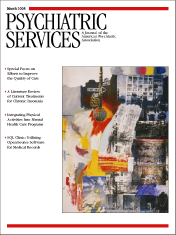HMOs' Restrictions on Clinical Practice
To the Editor: In the Managed Care column in the November issue, Dr. Gottlieb and her coauthors (1) describe their efforts to persuade health maintenance organizations (HMOs) to consider clinical as well as financial issues in the coverage of psychotropic medication for Medicaid patients in southeastern Pennsylvania. The HMOs involved are AmeriChoice, Keystone Mercy, and Health Partners. As a community-based psychiatrist in this area, I would like to provide some feedback.
The foremost clinical issue in managed care coverage is to avoid arbitrary and unreasonable restrictions. For AmeriChoice patients, there are several restrictions. As of this writing, without authorization we are not allowed to prescribe escitalopram, aripiprazole, paroxetine CR, zolpidem, or bupropion XL; any second-generation antipsychotic within 45 days of prescribing another; any selective serotonin reuptake inhibitor (SSRI) within 24 days of prescribing another SSRI; different strengths of the same second-generation antipsychotic at the same time; different strengths of the same SSRI at the same time; more than one tablet of paroxetine of any strength per day; or more than two tablets of divalproex ER 500 mg per day.
Without authorization, Keystone Mercy does not cover sertraline, oxcarbazepine, or sildenafil, nor does Health Partners cover paroxetine CR or bupropion XL. As far as I know, no list is distributed by HMOs to psychiatrists to let us know which medications need authorization. As a result, patients are often denied medications at the pharmacy.
To remedy this clinical chaos, Dr. Gottlieb and her coauthors favor a single payer for psychotropic medication. However, a single payer could force uniform but clinically restrictive guidelines on psychiatrists. For example, current guidelines used by AmeriChoice and Keystone Mercy discourage the addition of one second-generation antipsychotic to another, even though no adequate research supports this view (2,3,4). Some of my patients are helped by an additional second-generation antipsychotic. Admittedly, these are just one psychiatrist's observations; however, in the absence of adequate double-blind studies, we should be allowed to use our observations.
The guidelines used by AmeriChoice and Keystone Mercy advise switching to clozapine if different brands of second-generation agents do not fully work as monotherapy. However, if the patient has had a significant but partial response to the maximum dosage of a second-generation antipsychotic with minimal or no side effects, and if an additional second-generation agent further decreases the patient's symptoms with minimal or no side effects, why would the patient choose clozapine, with its required biweekly laboratory tests and increased risk of weight gain, lethargy, seizures, diabetes mellitus, hypercholesterolemia, myocarditis, and agranulocytosis?
Currently, I can advise such a patient to switch to one of the three HMOs (Health Partners) allows an additional second-generation antipsychotic. However, a single payer might complain about "therapeutic duplication" and "polypharmacy" and might restrict my efforts to help this patient.
I do not believe that there is a single solution to the above problems. I do hope that the three HMOs involved, as well as any advisory committee, will fully recognize the problems and will listen to feedback from community-based psychiatrists.
Dr. Wilf is a consultant at Warren E. Smith Health Centers, a community mental health center in Philadelphia.
1. Gottlieb D, Dubin WR, Ning A, et al: Improving psychiatric drug benefit management: IV. experiences of a pharmacy advisory committee. Psychiatric Services 55:1210–1212, 2004Link, Google Scholar
2. Practice guideline for the treatment of patients with schizophrenia, 2nd ed. American Journal of Psychiatry 161(Feb suppl):1–56, 2004Google Scholar
3. Miller AL, Chiles JA, Chiles JK, et al: The Texas Medication Algorithm Project (TMAP) schizophrenia algorithm. Journal of Clinical Psychiatry 60:649–657, 1999Crossref, Medline, Google Scholar
4. Treatment of Schizophrenia 1999: the Expert Consensus Guideline Series. Journal of Clinical Psychiatry 60(suppl 11):3–80, 1999Medline, Google Scholar



